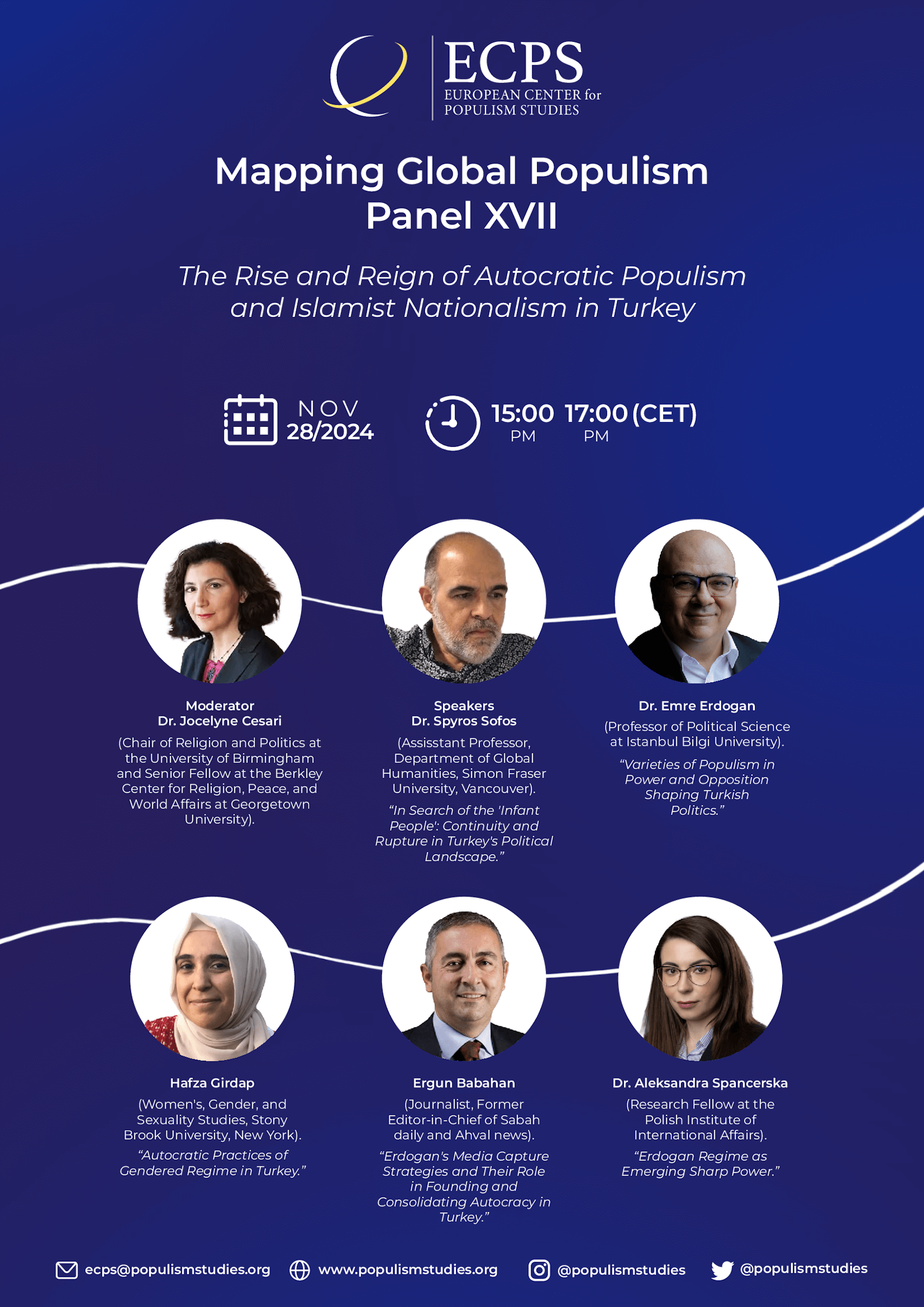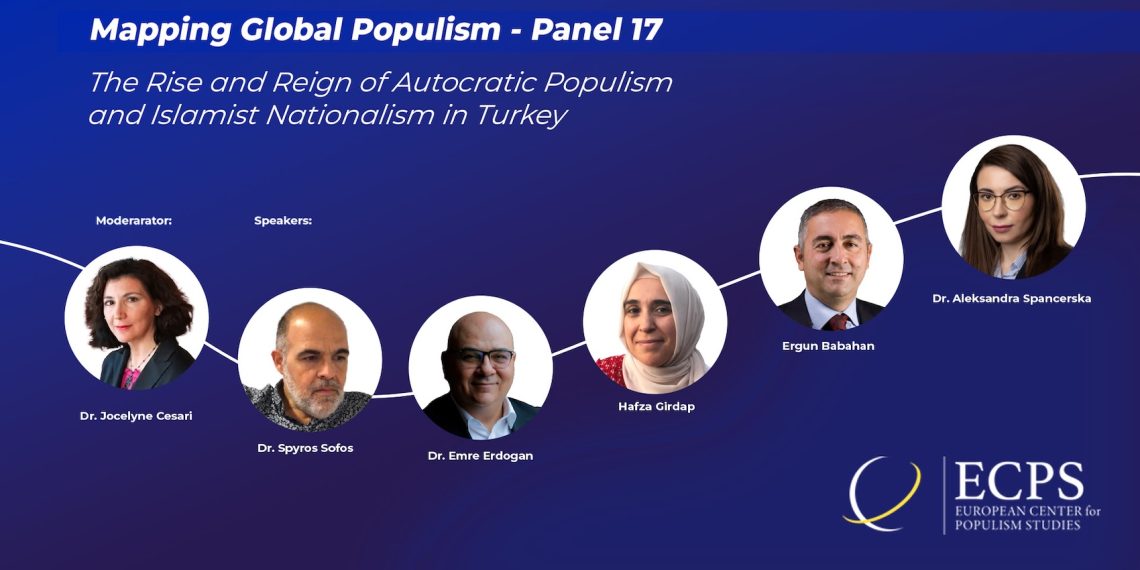Date/Time: Thursday, November 28, 2024 — 15:00-17:10 (CET)
Moderator
Dr. Jocelyne Cesari (Chair of Religion and Politics at the University of Birmingham (UK) and Senior Fellow at the Berkley Center for Religion, Peace, and World Affairs at Georgetown University).
Speakers
“In Search of the ‘Infant People’: Continuity and Rupture in Turkey’s Political Landscape,” Dr. Spyros Sofos (Assisstant Professor, Department of Global Humanities, Simon Fraser University, Vancouver).
“Populism in Transition: Continuities and Shifts in Turkey’s Political Landscape (2023-2024),” by Dr. Emre Erdogan (Professor of Political Science at Istanbul Bilgi University).
“Autocratic Practices of The Gendered Regime in Turkey,” by Hafza Girdap (Women’s, Gender, and Sexuality Studies, Stony Brook University, New York).
“Erdogan’s Media Capture Strategies and Their Role in Founding and Consolidating Autocracyin Turkey,” by Ergun Babahan (Journalist, Former Editor-in-Chief of Sabah daily and Ahval news).
“Erdogan Regime as Emerging Sharp Power,” by Dr. Aleksandra Spancerska (Research Fellow at the Polish Institute of International Affairs).
Brief Biographies and Abstracts
Professor Jocelyne Cesari holds the Chair of Religion and Politics at the University of Birmingham (UK) and is Senior Fellow at the Berkley Center for Religion, Peace, and World Affairs at Georgetown University. Since 2018, she is the T. J. Dermot Dunphy Visiting Professor of Religion, Violence, and Peacebuilding at Harvard Divinity School. President elect of the European Academy of Religion (2018-19), her work on religion and politics has garnered recognition and awards: 2020 Distinguished Scholar of the religion section of the International Studies Association, Distinguished Fellow of the Carnegie Council for Ethics and International Affairs and the Royal Society for Arts in the United Kingdom. Her new book: We God’s Nations: Political Christianity, Islam and Hinduism in the World of Nations, was published by Cambridge University Press in 2022 (Book Award of the Scientific Society for the Study of Religion). Other publications: What is Political Islam? (Rienner, 2018, Book Award 2019 of the religion section of the ISA); Islam, Gender and Democracy in a Comparative Perspective (OUP, 2017), The Awakening of Muslim Democracy: Religion, Modernity and the State (CUP, 2014). She is the academic advisor of www.euro-islam.info
In Search of the ‘Infant People’: Continuity and Rupture in Turkey’s Political Landscape
Dr. Spyros Sofos is Assistant Professor in Global Humanities at Simon Fraser University, Canada. He has held academic positions in the UK, Sweden, and Italy, including at Lund University and the London School of Economics. His research examines the intersection of societal insecurity, identity, and collective action, with a focus on Turkish politics, nationalism, populism, European Muslim identities, and populism theory. His latest book, Turkish Politics and ‘The People’: Mass Mobilisation and Populism (Edinburgh University Press, 2022), traces the genealogy of populism in contemporary Turkey. He is the founder and lead editor of #RethinkingPopulism, originally launched in collaboration with openDemocracy.
Abstract: This talk explores the construction and evolution of the concept of "the people" in Turkey’s political discourse. It examines how ideas of popular identity have been historically used to support autocratic regimes, from Ataturk’s secularist rule in early republican Turkey to the tutelary democracies that followed his death and finally to the Islamist-nationalist populism of the present day. Central to this analysis is the metaphor of "the infant people," a symbol embodying both innocence and helplessness. The talk highlights how political elites have alternately celebrated and patronized "the people," portraying them as the rightful bearers of sovereignty while simultaneously deeming them unprepared to exercise their rights. This dual approach has fostered a flexible yet exclusionary narrative of nationhood—one that legitimizes authoritarian governance and deepens divisions between the people, their supposed guardians, and perceived enemies. By situating this analysis within broader discussions of populist authoritarianism in the Global South, the talk sheds light on the intersection of identity politics and power.
Populism in Transition: Continuities and Shifts in Turkey’s Political Landscape (2023-2024)
Dr. Emre Erdogan is a Professor at the Department of International Relations, Istanbul Bilgi University. With a doctoral degree in Political Science from Bogaziçi University, he has served as researcher and senior consultant in various projects in academia and civil society. His research focuses on political participation, foreign policy and public opinion, child and youth well-being, methodology and statistics. He extensively studies and publishes about youth in Turkey, integration of Syrian refugee youth in Turkey, othering, polarization and populism.
Abstract: This presentation examines the evolving dynamics of populism in Turkey, focusing on the 2023 presidential and 2024 local elections. It highlights the continuities and shifts in populist strategies, exploring how nationalist rhetoric, religious symbolism, and anti-elitist narratives have persisted as central pillars of political discourse. Simultaneously, the presentation delves into significant changes, such as the impact of economic challenges, the rise of new populist actors, and the opposition’s adoption of populist tactics to counter the ruling party. By analyzing these trends, the study reveals how populism has reshaped Turkey’s political and social landscape over the past two years. It addresses critical themes, including heightened polarization, the strategic use of media, and the enduring focus on identity politics. Special attention will be given to how crises like economic instability and natural disasters have influenced populist rhetoric and voter behavior. The presentation aims to provide a comprehensive understanding of the interplay between continuity and change in Turkish populism, offering insights into its implications for democracy and governance. Through this lens, the audience will gain a nuanced perspective on the strategies employed by political actors and the broader socio-political consequences of rising populism in Turkey.
Autocratic Practices of the Gendered Regime in Turkey
Hafza Girdap is an adjunct lecturer in Women’s and Gender Studies at Stony Brook University, New York, where she is also a Ph.D. candidate. She is the spokesperson and program director at Advocates of Silenced Turkey (AST) and a founding member of Set Them Free, focusing on addressing women’s rights violations in Turkey. Girdap’s research examines human rights and the lives of Muslim women, particularly immigrant women’s experiences of integration and cultural identity. Her doctoral work explores self-identification and gendered racialization among immigrant women from Turkey in the US. Beyond academia, Girdap collaborates with research institutes on gender studies, incorporating the voices of women from non-Western contexts. Living in the US since 2016 due to political persecution, she has organized and spoken at UN panels on women’s issues, mentors youth, and runs online global book clubs that address women’s and youth empowerment.
Abstract: This presentation examines how patriarchy, nationalism, and political Islam intersect to shape women’s status and rights in Turkey, with a specific focus on the Justice and Development Party (AKP) era. Both secular and political Islamist patriarchies impose traditional roles on women, while Sunni nationalist hegemony marginalizes not only ethnic minorities, non-Sunni groups, and LGBTQ+ individuals but also those who fall outside the established identity of the mainstream political framework. Drawing on Islamist discourse, I will explore how the AKP has employed state policies and discursive language to regulate women’s status and justify systemic oppression. These dynamics underscore the gendered dimensions of Turkey’s autocratic regime, where authoritarian practices perpetuate systemic violence and inequality.
Erdogan’s Media Capture Strategies and Their Role in Founding and Consolidating Autocracy in Turkey
Ergun Babahan, born in Izmir, Turkey, in 1960, is a senior Turkish journalist. He studied law at Istanbul University, graduating in 1981. After practicing law for a year, he chose journalism as his profession. Over the years, he has worked in various prominent newspapers, including Yeni Asir, Soz, Hurriyet, Sabah, Aksam, and Star, serving as a reporter, editor, managing editor, editor-in-chief, and columnist. As editor-in-chief of Sabah, then Turkey’s second-largest newspaper, he successfully led the publication out of bankruptcy. Mr. Babahan has also enriched his professional experience internationally, attending the John S. Knight Journalism Fellowship Program at Stanford University through a scholarship from the German Marshall Fund. Additionally, he participated in a seminar on the American Foreign Policy Process at the University of Maryland, supported by the Ford Foundation.
Abstract: Erdogan once remarked to me, “The media does not bring you to power, but it can easily take you out of power.” This insight shaped his determination to control the mediafrom the beginning of his political career. Having endured significant challenges from a media landscape under the influence of the military tutelage regime, Erdogan sought not to create an independent media but rather to make the media entirely subservient to his authority. He achieved this by exploiting conflicts among media proprietors and leveraging the state’s financial and legal resources. Today, no media structure in Turkey operates independently of Erdogan’s influence—not even outlets that label themselves as opposition. Turkey’s historical tradition of media servitude to those in power has significantly facilitated this process. Erdogan’s unprecedented control over the medianow rivals the dominance once held by Mustafa Kemal Ataturk and the architects of military coups, shaping what he terms as "truth." In this presentation, I will explore why the emergence of an independent media is virtually impossible in a society where reverence for state authority and wealth is deeply ingrained.
Erdogan Regime as Emerging Sharp Power
Dr. Aleksandra Maria Spancerska is a research fellow on Türkiye in the Middle East and Africa Programme. She graduated in international cultural studies and international relations with an oriental specialisation from the Faculty of International and Political Studies at the University of Lodz. She received her PhD in 2024 in the field of social sciences in the discipline of political science and administration. She conducts research on Turkish domestic and foreign policy. She speaks English and Turkish.
Abstract: The concept of sharp power represents a novelty in the study of international relations. It was introduced into scholarly discourse by Christopher Walker and Jessica Ludwig in 2017 at the International Forum for Democratic Studies. The purpose of the speech is to indicate the different areas of Türkiye’s activity in the international forum in terms of sharp power. In my speech I will focus in particular on: technology, modern forms of censorship, political dissidents, and the Turkish diaspora abroad.



